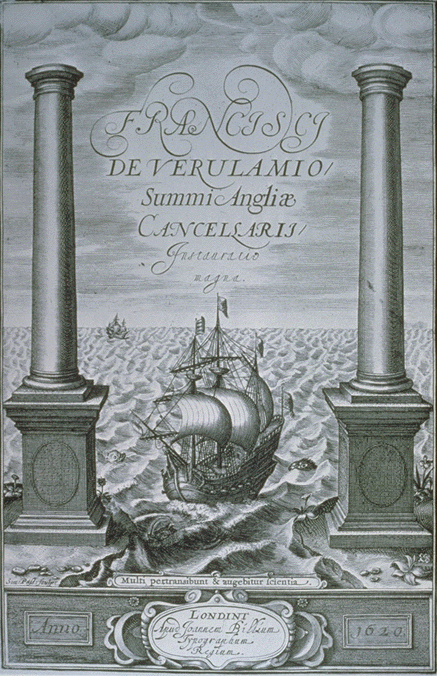Bacon and Baconian Science
Related lecture:
Kampis, G. (2002): Facets of Causation
, MidSouth Philosophy Conference, Memphis, Tenn., Feb.16.
This is the title page from Bacon's Instauratio Magna (1620)
which contains his Novum Organum (
http://www.gmu.edu/departments/fld/CLASSICS/bacon.html
)
which is a new method to replace that of Aristotle.
My summary:
science is essentially causal;
causality is a property of activity and action,
so (my conclusion):
to equate science with descriptions (or "theories"
- the propositional or "text mode" of science) is fundamentally wrong
(see below)

The image is of a ship passing through the pillars of Hercules, which
symbolized for the ancients the limits of man's possible explorations.
The image represents the analogy between the great voyages of discovery
and the explorations leading to the advancement of learning. In The Advancement
of Learning Bacon makes this analogy explicit. Speaking to James I, to whom
the book is dedicated, he writes: "For why should a few received authors
stand up like Hercules columns, beyond which there should be no sailing
or discovering, since we have so bright and benign a star as your Majesty
to conduct and prosper us." The image also forcefully suggests that using
Bacon's new method, the boundaries of ancient learning will be passed.
The Latin phrase at the bottom from the Book of Daniel means: "Many will
pass through and knowledge will be increased."
Bacon saw himself as the inventor of a method which would kindle a light
in nature - "a light that would eventually disclose and bring into sight
all that is most hidden and secret in the universe."
This method involved the collection of data,
their judicious interpretation, the carrying out of experiments, thus
to learn the secrets of nature by organized observation of its regularities.
Bacon's proposals had a powerful influence on the development
of science in seventeenth century Europe. Thomas Hobbes served as Bacon's
last amunensis or secretary. Many members of the British Royal Society saw
Bacon as advocating the kind of enquiry conducted by that society.
